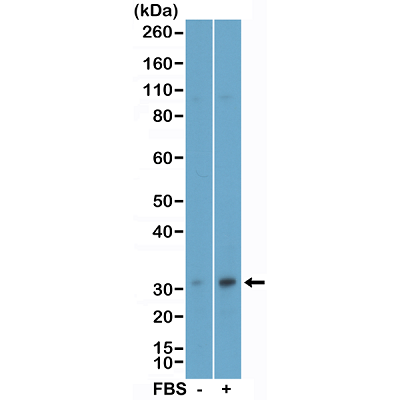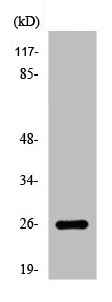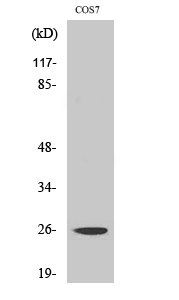
anti-Phospho-eIF4E (Ser209), Rabbit Monoclonal (RM452)
REV-31-1344-00
ApplicationsWestern Blot
Product group Antibodies
ReactivityHuman
TargetEIF4E
Overview
- SupplierRevMAb Biosciences
- Product Nameanti-Phospho-eIF4E (Ser209), Rabbit Monoclonal (RM452)
- Delivery Days Customer10
- ApplicationsWestern Blot
- CertificationResearch Use Only
- ClonalityMonoclonal
- Clone IDRM452
- Gene ID1977
- Target nameEIF4E
- Target descriptioneukaryotic translation initiation factor 4E
- Target synonymsAUTS19, CBP, EIF4E1, EIF4EL1, EIF4F, eIF-4E, eukaryotic translation initiation factor 4E, eIF-4F 25 kDa subunit, eukaryotic translation initiation factor 4E-like 1, mRNA cap-binding protein
- HostRabbit
- IsotypeIgG
- Protein IDP06730
- Protein NameEukaryotic translation initiation factor 4E
- Scientific DescriptioneIF4E is involved in several cellular processes including enhanced translational efficiency, splicing, mRNA stability, and RNA nuclear export. All eukaryotic cellular mRNAs are blocked at their 5-prime ends with the 7-methylguanosine cap structure, m7GpppX (where X is any nucleotide). eIF4E is a eukaryotic translation initiation factor involved in directing ribosomes to the cap structure of mRNAs. It is a 24-kD polypeptide that exists as both a free form and as part of the eIF4F pre-initiation complex. Almost all cellular mRNA require eIF4E in order to be translated into protein. The eIF4E polypeptide is the rate-limiting component of the eukaryotic translation apparatus and is involved in the mRNA-ribosome binding step of eukaryotic protein synthesis. - Recombinant Antibody. This antibody reacts to human eIF4E only when phosphorylated at Ser209. There is no cross-reactivity to eIF4E that is not phosphorylated. This antibody may also react to mouse or rat Phospho-eIF4E (Ser209) as predicted by immunogen homology. Applications: WB. Clone: RM452. Isotype: Rabbit IgG. Formulation: Liquid. 50% Glycerol/PBS with 1% BSA and 0.09% sodium azide. eIF4E is involved in several cellular processes including enhanced translational efficiency, splicing, mRNA stability, and RNA nuclear export. All eukaryotic cellular mRNAs are blocked at their 5-prime ends with the 7-methylguanosine cap structure, m7GpppX (where X is any nucleotide). eIF4E is a eukaryotic translation initiation factor involved in directing ribosomes to the cap structure of mRNAs. It is a 24-kD polypeptide that exists as both a free form and as part of the eIF4F pre-initiation complex. Almost all cellular mRNA require eIF4E in order to be translated into protein. The eIF4E polypeptide is the rate-limiting component of the eukaryotic translation apparatus and is involved in the mRNA-ribosome binding step of eukaryotic protein synthesis.
- ReactivityHuman
- Storage Instruction-20°C
- UNSPSC12352203







